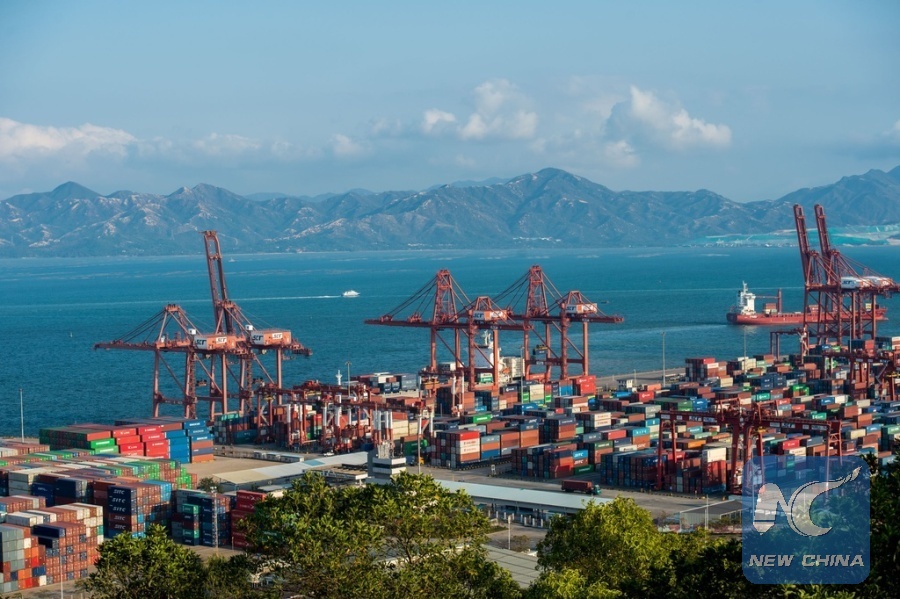
China economic transition brings chances in e-commerce, high-end manufacturing. (Xinhua Photo)
WASHINGTON, Jan. 9 (Xinhua) -- World Bank on Tuesday raised its forecast for global economic growth in 2018 to 3.1 percent, saying that a broad-based recovery was underway across the world.
The forecast was 0.2 percentage point higher than its projections in June last year, said the Washington-based lender in its flagship Global Economic Prospects report.
"2018 is on track to be the first year since the financial crisis that the global economy will be operating at or near full capacity," said the lender.
It estimated that the global growth reached 3 percent in 2017, the strongest pace since 2011 and a notable recovery from a post-crisis low of 2.4 percent in 2016.
Growth increased in more than half of the world's economies in 2017, highlighting the broad-based nature of the recovery, said the lender.
It expected the global growth to slow to 3 percent in 2019 from 3.1 percent in 2018 and further down to 2.9 percent in 2020.
According to its forecast, growth in advanced economies is expected to moderate slightly to 2.2 percent in 2018 from 2.3 percent in 2017, because major central banks are likely to gradually withdraw from accommodative monetary policies.
With stronger private investment, U.S. economy is estimated to grow 2.3 percent in 2017. The growth is expected to accelerate to 2.5 percent in 2018 and then moderate to an average of 2.1 percent in 2019 and 2020.
The World Bank expected that the tax bill recently approved by the U.S. Congress is expected to boost corporate investment because of the low corporate tax rate and full expensing of new equipment.
However, it warned that the benefits of fiscal stimulus will likely be constrained because the economy is already at near full capacity and the pace of monetary policy normalization might accelerate.
In regard to emerging market and developing economies, the lender expected these economies to grow 4.5 percent in 2018, accelerating from the estimated 4.3 percent increase in 2017. The growth rate will further accelerate to 4.7 percent in 2019 and 2020.
The World Bank also upgraded its forecast for China's economic growth in 2018. Chinese economy is estimated to grow 6.8 percent in 2017, 0.3 percentage points higher than its forecast in June last year.
It expected the economy to grow 6.4 percent in 2018, 0.1 percentage point higher than its June's forecast. The growth will moderate to 6.3 percent in 2019, as China will continue to rebalance its economy and credit growth is expected to decelerate.
Chinese economy continues to make progress in rebalancing, with consumption and services sector maintaining relatively fast growth, said Ayhan Kose, director of the Word Bank's Development Economic Prospects Group, in a teleconference on Tuesday.
He suggested that China should continue to take measures to eliminate excess industry capacity and control risks in financial system.
Despite the optimistic forecast, the World Bank warned that risks to the outlook remain tilted to the downside, which includes an abrupt tightening of global financing conditions, escalating trade restrictions and rising geopolitical tensions.
In the report, the lender also warned of the slowing potential growth over the longer term, which was seen in economies that account for more than 65 percent of global GDP.
The slowing productivity growth, weak investment and shrinking share of labor force are all contributing to the slowdown of potential growth, said the bank.
"The broad-based recovery in global growth is encouraging, but this is no time for complacency," said Jim Yong Kim, president of the World Bank, in a statement on Tuesday.
"This is a great opportunity to invest in human and physical capital. If policy makers around the world focus on these key investments, they can increase their countries' productivity, boost workforce participation, and move closer to the goals of ending extreme poverty and boosting shared prosperity," said Kim.

